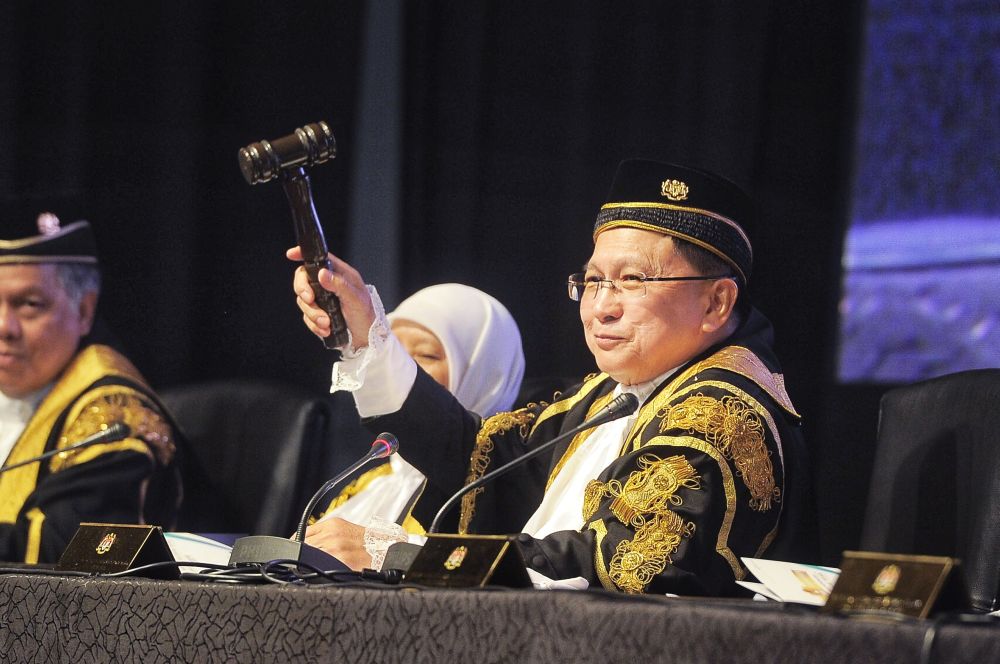KUALA LUMPUR, May 21 — While most Malaysians remember Tan Sri Richard Malanjum as the first east Malaysian to be appointed chief justice, the top judge who retired recently has also been praised for upholding the Federal Constitution.
Retired Court of Appeal judge Datuk Hishamudin Yunus recently told Malay Mail that Malanjum is a “fearless and staunch defender of the integrity of the Federal Constitution and fundamental liberties.”
He highlighted five of Malanjum’s most significant court rulings which he said “made important contributions to the positive developments of constitutional law”, and also noted that he does not hesitate to write dissenting or separate judgments when he considers it his judicial duty to do so.
The dissenting/separate judgments at the Federal Court
1. The Lina Joy case (2007)
What was this case about: A woman named Lina Joy, who had renounced Islam and embraced Christianity, applied to remove the word “Islam” from her identity card. The National Registration Department (NRD) refused her application, insisting that she must produce a certificate of apostasy issued by the Shariah court.
The case went through the High Court, the Court of Appeal and even the Federal Court, where the NRD’s position was upheld.
The Federal Court’s decision was a 2-1 ruling, with Malanjum disagreeing with then Chief Justice Ahmad Fairuz Sheikh Abdul Halim and fellow judge Alauddin Mohd Sheriff.
In Hishamudin’s words: “Justice Richard Malanjum, however, in his dissenting judgment held that the refusal of the National Registration Department to remove the word ‘Islam’ from Lina Joy’s identity card is unconstitutional as it is against Article 8 of the Federal Constitution (that prohibits laws that discriminate, except in permitted circumstances). The Regulations requiring Muslims to declare their religion when applying for identity cards discriminates against them, as non-Muslims, in applying for identity cards, are not required to state his/her religion.
“Justice Richard Malanjum further held that the insistence by the National Registration Department for a certificate of apostasy from the Federal Territory Syariah Court was not only unlawful but also unreasonable, as the Syariah Court in the Federal Territory had no statutory power to adjudicate on the issue of apostasy.
“Moreover, apostasy is not an issue that is exclusively within the realm of the Syariah Court. The issue of apostasy involves complex questions of constitutional importance and thus the civil court should not have declined jurisdiction to hear the application.”

2. The Herald case (2014)
What was this case about: The home minister in January 2009 banned the Catholic Church’s internal newsletter Herald from using the Arabic word for God, “Allah”, in its Bahasa Malaysia section.
The High Court ruled the ban to be unlawful and unconstitutional, while the Court of Appeal reversed the decision by ruling the home minister had the power to impose the ban as a condition for the renewal of Herald’s publication permit.
In June 2014, the Federal Court in a 4-3 decision rejected the Catholic Church’s bid for leave to appeal the Court of Appeal’s decision, where the majority of judges cited the Federal Constitution’s Articles 4(3) and 4(4) when ruling that laws cannot be made invalid by way of “collateral attack”, Hishamudin explained.
Malanjum was one of the three Federal Court judges who disagreed with the majority’s ruling, and Hishamudin highlighted the points made by Malanjum:
“As one of his grounds he pointed out that It was an undisputed fact that the Herald newsletter (that contained the word ‘Allah’) had been in circulation for the past 14 years before the imposition of the Minister’s decision; and that there was no evidence shown of prejudice to public order during that period; and that the use of the word ‘Allah’ was not prohibited in other publications such as the Al-Kitab and the Sikh Holy Book.
“According to Justice Richard Malanjum, there were merits in the applicant’s contention that the Minister’s decision contravened Article 11(1) and (3) of the Federal Constitution, and therefore leave to appeal to the Federal Court ought to be granted (whereas in this case leave to appeal to the Federal Court was refused by the Federal Court).”
 3. Public Prosecutor vs Koh Wah Kuan (2007)
3. Public Prosecutor vs Koh Wah Kuan (2007)
What was this case about: Koh was a child accused of intentionally killing his tuition teacher’s daughter and was found guilty of murder.
Acting under Section 97(2) of the Child Act 2001, the trial court ordered Koh to be detained at the pleasure of the Yang di-Pertuan Agong. The Court of Appeal struck down Section 97(2) for being in violation of the doctrine of separation of powers, which is one of the basic features of the Federal Constitution, Hishamudin explained.
The Federal Court reversed the Court of Appeal’s decision, with Malanjum writing a separate judgment that gave different reasons from the four other Federal Court judges for the same ruling.
Hishamudin explained that the four other judges had held that a law made by Parliament could not be struck down for violating the doctrine of separation of powers, as the Federal Constitution did not have provisions expressly setting out the doctrine.
Hishamudin described the majority judgment as adopting a literal interpretation of the Federal Constitution’s Article 121, which he said was an interpretation “inconsistent” with the spirit of the Constitution.
In Hishamudin’s own words regarding Malanjum’s “bold but separate judgment”:
“In this case Justice Richard Malanjum maintained that notwithstanding Article 121 of the Federal Constitution, the judicial power of the judiciary remains intact in the Constitution; that the jurisdiction and powers of the courts cannot be confined to federal law; and that the doctrines of separation of powers and the independence of the judiciary are basic features of our Constitution.”
Having provided a brief recap of the cases where Malanjum made his differing opinions known, Hishamudin said it was “no surprise” that Malanjum had upon appointment as chief justice wasted no time in advising Federal Court and Court of Appeal judges of their duty to do the same.
Hishamudin said Malanjum had advised the judges that they have a “judicial duty to deliver dissenting or separate judgments, whenever the judges in deciding over a case are of the firm opinion that they do not agree with the majority decision; instead of merely concurring with the majority just for the sake of convenience or expediency.”
The unanimous rulings at the Federal Court
4. Sivarasa Rasiah vs Badan Peguam Malaysia (2010)
Why this case was important: Malanjum was part of the three-member Federal Court panel chaired by then judge Datuk Seri Gopal Ram, who delivered the unanimous ruling in this case.
With this “historic landmark decision”, Hishamudin said the Federal Court took a “bold step forward” in relation to the judiciary’s role in protecting fundamental liberties, especially the constitutional right to freedom of speech.
“The Federal Court held that Parliament could not impose a restriction on freedom of speech in any manner it deemed fit; and that any restriction imposed on freedom of speech by Parliament must be a reasonable restriction,” Hishamudin explained.
“The Federal Court also went further to hold that the fundamental rights guaranteed by Part II of the Federal Constitution form part of the basic structure of the Federal Constitution, thereby giving recognition for the first time, but albeit partially, to the doctrine of basic structure as enunciated by the Supreme Court of India in the landmark case of Kesavananda Bharati v State of Kerala,” he said, describing this as a “remarkable development in the law” in contrast to the apex court’s previous position in Loh Kooi Choon v Government of Malaysia.

5. M. Indira Gandhi vs Pengarah Jabatan Agama Islam Perak and others (2018)
What this case was about: Hindu mother M. Indira Gandhi had challenged her Muslim convert ex-husband’s unilateral conversion to Islam of their three children born in a civil marriage, succeeding in the High Court before the Court of Appeal reversed it.
Hishamudin said the Federal Court had in this landmark case “correctly overturned” the Court of Appeal’s majority judgment, when ruling in Indira’s favour by holding that the children’s unilateral conversion to Islam was unlawful and invalid due to the ex-husband and the Perak religious authority’s breaching of the provisions in the Administration of the Religion of Islam (Perak) Enactment 2004.
Hishamudin described the Federal Court’s unanimous decision here as yet another “bold and historic” judgment of the apex court, noting that Malanjum sat in the five-man panel where the judgment was delivered by then judge Tan Sri Zainun Ali.
Hishamudin highlighted the Federal Court’s ruling that the conversions were unconstitutional for breaching the Federal Constitution’s Article 12(4) and how the apex court[d] now correctly interpreted the word “parent” in the provision to mean both a child’s father and mother if they are both still alive. The interpretation of the word “parent” was a crucial point to determine if both parents’ consent are required for the conversion to Islam of a child born in a non-Muslim marriage.
“Secondly, the Federal Court in its landmark judgment rightly seized the opportunity to clarify the limits of the jurisdiction of the Syariah Court,” Hishamudin said, describing it as a long overdue move as the Shariah courts’ jurisdiction limits had been much misunderstood following the Article 121(1A) amendment in 1988.
Hishamudin said even civil court judges had misunderstood this by erroneously declining jurisdiction over matters in favour of the Shariah court, but said the apex court in Indira’s case has now made clear that the Shariah courts’ jurisdiction must be provided for under the relevant state laws and is limited to items listed constitutionally under the states’ jurisdiction.
The Federal Court also ruled that Article 121(1A) is not a blanket exclusion of the civil courts’ jurisdiction whenever a matter related to Islamic law arises, and that the civil courts’ inherent powers of judicial review and interpretation of the Constitution or laws cannot be removed by Article 121(1A), he said.
Hishamudin also noted the Federal Court ruling reaffirmed several “constitutional law principles of great importance”, namely that judicial power is vested exclusively in the civil High Courts via Article 121(1) and that features of the Constitution’s basic structure such as judicial power and particularly the power of judicial review cannot be removed by Parliament via a constitutional amendment.
 Hishamudin said these five judgments are part of Malanjum’s legacy which he will be remembered for.
Hishamudin said these five judgments are part of Malanjum’s legacy which he will be remembered for.
George Varughese, the immediate past president of the Malaysian Bar who was in office during Malanjum’s tenure as chief justice, said the latter’s dissenting judgment in PP v Koh Wah Kuan “where he defended the doctrines of separation of powers and independence of the judiciary” was “outstanding.”
6. The double presumption case (2019)
Varughese also told Malay Mail that another landmark ruling by Malanjum was the Federal Court’s April 5, 2019 decision in two drug trafficking cases, where the double presumption of guilt in the Dangerous Drugs Act (DDA) was held to be unconstitutional for violating Articles 5(1) and 8(1) of the Federal Constitution.
What the cases were about: Two foreigners were separately found with drugs hidden inside their bags.
The trial judges had in both cases ruled that the presumption that they have possession and knowledge of the drugs (under Section 37 DDA) applies since their custody and control of the drugs were proven, and that the presumption that they were trafficking in drugs (under Section 37(da) DDA) also applies since the drug’s weight exceeded the weight listed in the DDA.
The two foreigners were convicted of drug trafficking which carries the mandatory death penalty, and had appealed unsuccessfully at the Court of Appeal before further appealing to the Federal Court.
Quick history: The Federal Court had in the drug trafficking case of Muhammed Hassan v Public Prosecutor (1998) found that the presumption of possession under Section 37(d) cannot be used to invoke the presumption of trafficking under Section 37(da) as it would be harsh and oppressive against the accused.
Parliament then introduced Section 37A under the DDA which came into force in February 2014 to overcome the effect of the 1998 court ruling, with this new provision saying that a presumption may be used together with another presumption.
What the Federal Court said in its unanimous ruling delivered by Malanjum:
The apex court explained that Section 37A of the DDA allows for a double presumption, where an accused is presumed to have possession and knowledge of the drug under Section 37(d) once the prosecution proves that they had custody and control of the drug, with this “deemed possession” then used to invoke a further presumption of drug trafficking under Section 37(da) if the drug quantity is more than the weight limit in DDA.
This means the prosecution only needs to prove the accused’s custody and control of the drug and the drug’s weight to make a prima facie case for drug trafficking, with the accused then placed under legal burden to disprove the “double presumptions” on a balance of probabilities.
The Federal Court said this legal burden is a “grave erosion to the presumption of innocence” covered under the Federal Constitution’s Article 5(1), which provides that no person shall be deprived of his life or personal liberty except in accordance with the law.
The Federal Court said the application of the “double presumptions” carries a real risk of an accused being convicted of drug trafficking in circumstances where there remains a significant reasonable doubt in relation to the offence’s main elements, noting that the use of presumed possession to invoke presumed trafficking was a “grave departure” from the general rule that the prosecution has to prove an accused’s guilt beyond reasonable doubt.
The Federal Court struck down Section 37A for being unconstitutional due to its severe incursion of the accused’s right under Article 5(1) and for failing to meet the requirement under Article 8(1) to be proportionate.
The Federal Court then quashed the two accused’s drug trafficking convictions, substituting it with jail terms for possession of drugs.
This is Part III of Malay Mail’s recap of the highlights of Malanjum’s career as a judge. Click here to read Part I and click here for Part II.



















